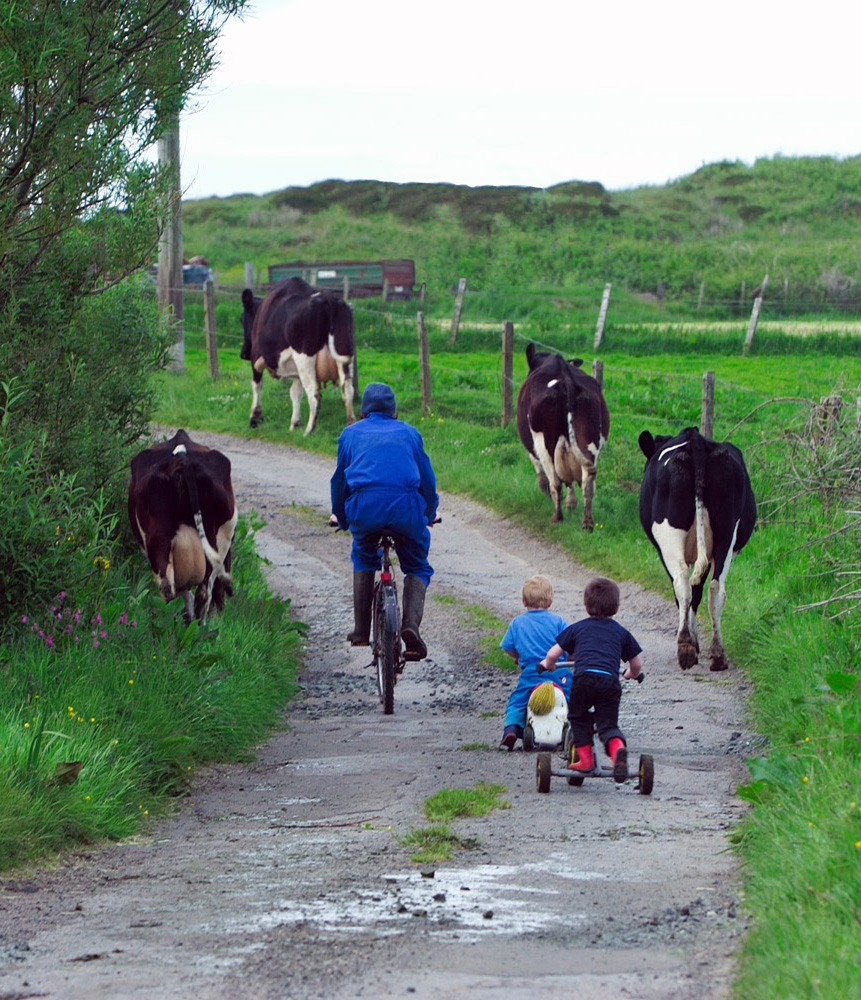The Cost of Cheaper Milk
By Don Dennis ’82
 I’m pretty sure I am the only American milkman in Scotland, the result of my having married a dairy farmer over here on one of the smaller islands. Due to the collapse of the bulk milk price, we began pasteurising and bottling Emma’s milk in returnable glass bottles two years ago, selling it through small village shops in this sparsely populated county. Along the way, we discovered that good-tasting milk has been almost entirely removed from the marketplace in most developed countries.
I’m pretty sure I am the only American milkman in Scotland, the result of my having married a dairy farmer over here on one of the smaller islands. Due to the collapse of the bulk milk price, we began pasteurising and bottling Emma’s milk in returnable glass bottles two years ago, selling it through small village shops in this sparsely populated county. Along the way, we discovered that good-tasting milk has been almost entirely removed from the marketplace in most developed countries.
It was the arrival of the supermarkets, and the accompanying decline in home deliveries of milk, that brought this about. Fifty years ago, milk tasted better because it was pasteurized at a low temperature (63˚C) and held there for 30 minutes. The supermarkets came along and wanted cheaper milk to lure in the customers. And so the dairy processing companies introduced pasteurizing at 73˚C for 15 seconds, which is at least 120 times faster as a process, hence far cheaper. The fact that it drastically harms the taste was not the supermarkets’ concern. They got the cheap milk they wanted.
Something akin to that has happened with organic milk in the US: 80 percent of it is Ultra-High Temperature (UHT) treated (heated to more than 135˚C), so as to give it a six-month shelf life. The supermarkets wouldn’t carry it unless it had that sort of shelf life, as it is too much of a niche item.
In Australia, most milk is pasteurised at 81.6˚C for only two seconds! You can see the trend. Milk is supposed to be as cheap as possible, and so you reduce the costs of farming by having mega-herds of cows that stay indoors 365 days a year and never see grass; and you speed up the pasteurizing process, no matter what the cost is in terms of taste.
Ours is the only commercial dairy in Scotland that pasteurizes milk the old-fashioned way, with the low-temperature protocol. Hence it costs considerably more than supermarket white stuff. And yet we have found that it sells well anywhere we can reach with our distribution. People are continually amazed, and grateful, to find milk that tastes like the milk they had when they were children 50 or more years ago. And the glass bottle is a bonus.
Don Dennis delivers his Wee Isle Dairy whole milk from the isle of Gigha to points in Scotland as far away as Edinburgh, Penicuik, and Peebles. As if that’s not enough, he is also director of the Flower Essence Repertoire Ltd, producing a unique range of flower essences with tropical orchids. Learn more at healingorchids.com. Photos by Don Dennis
